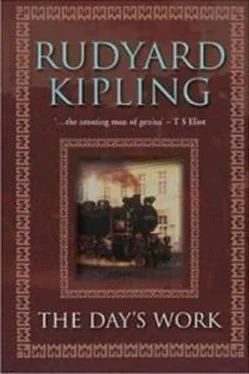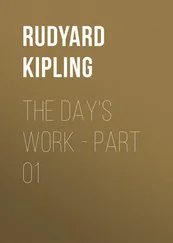Джозеф Киплинг - The Day's Work - Volume 1
Здесь есть возможность читать онлайн «Джозеф Киплинг - The Day's Work - Volume 1» весь текст электронной книги совершенно бесплатно (целиком полную версию без сокращений). В некоторых случаях можно слушать аудио, скачать через торрент в формате fb2 и присутствует краткое содержание. Год выпуска: 2014, Издательство: epubBooks Classics, Жанр: Прочие приключения, на английском языке. Описание произведения, (предисловие) а так же отзывы посетителей доступны на портале библиотеки ЛибКат.
- Название:The Day's Work - Volume 1
- Автор:
- Издательство:epubBooks Classics
- Жанр:
- Год:2014
- ISBN:нет данных
- Рейтинг книги:3 / 5. Голосов: 1
-
Избранное:Добавить в избранное
- Отзывы:
-
Ваша оценка:
- 60
- 1
- 2
- 3
- 4
- 5
The Day's Work - Volume 1: краткое содержание, описание и аннотация
Предлагаем к чтению аннотацию, описание, краткое содержание или предисловие (зависит от того, что написал сам автор книги «The Day's Work - Volume 1»). Если вы не нашли необходимую информацию о книге — напишите в комментариях, мы постараемся отыскать её.
The Day's Work - Volume 1 — читать онлайн бесплатно полную книгу (весь текст) целиком
Ниже представлен текст книги, разбитый по страницам. Система сохранения места последней прочитанной страницы, позволяет с удобством читать онлайн бесплатно книгу «The Day's Work - Volume 1», без необходимости каждый раз заново искать на чём Вы остановились. Поставьте закладку, и сможете в любой момент перейти на страницу, на которой закончили чтение.
Интервал:
Закладка:
So the bridge was two men's work—unless one counted Peroo, as Peroo certainly counted himself. He was a Lascar, a Kharva from Bulsar, familiar with every port between Rockhampton and London, who had risen to the rank of sarang on the British India boats, but wearying of routine musters and clean clothes, had thrown up the service and gone inland, where men of his calibre were sure of employment. For his knowledge of tackle and the handling of heavy weights, Peroo was worth almost any price he might have chosen to put upon his services; but custom decreed the wage of the overhead men, and Peroo was not within many silver pieces of his proper value. Neither running water nor extreme heights made him afraid; and, as an ex–serang, he knew how to hold authority. No piece of iron was so big or so badly placed that Peroo could not devise a tackle to lift it—a loose–ended, sagging arrangement, rigged with a scandalous amount of talking, but perfectly equal to the work in hand. It was Peroo who had saved the girder of Number Seven pier from destruction when the new wire rope jammed in the eye of the crane, and the huge plate tilted in its slings, threatening to slide out sideways. Then the native workmen lost their heads with great shoutings, and Hitchcock's right arm was broken by a falling T–plate, and he buttoned it up in his coat and swooned, and came to and directed for four hours till Peroo, from the top of the crane, reported "All's well," and the plate swung home. There was no one like Peroo, serang, to lash, and guy, and hold to control the donkey–engines, to hoist a fallen locomotive craftily out of the borrow–pit into which it had tumbled; to strip, and dive, if need be, to see how the concrete blocks round the piers stood the scouring of Mother Gunga, or to adventure up–stream on a monsoon night and report on the state of the embankment–facings. He would interrupt the field–councils of Findlayson and Hitchcock without fear, till his wonderful English, or his still more wonderful lingua franca, half Portuguese and half Malay, ran out and he was forced to take string and show the knots that he would recommend. He controlled his own gang of tacklemen—mysterious relatives from Kutch Mandvi gathered month by month and tried to the uttermost. No consideration of family or kin allowed Peroo to keep weak hands or a giddy head on the pay–roll. "My honour is the honour of this bridge," he would say to the about–to–be–dismissed. "What do I care for your honour? Go and work on a steamer. That is all you are fit for."
The little cluster of huts where he and his gang lived centred round the tattered dwelling of a sea–priest—one who had never set foot on black water, but had been chosen as ghostly counsellor by two generations of sea–rovers all unaffected by port missions or those creeds which are thrust upon sailors by agencies along Thames bank. The priest of the Lascara had nothing to do with their caste, or indeed with anything at all. He ate the offerings of his church, and slept and smoked, and slept again "for," said Peroo, who had haled him a thousand miles inland, "he is a very holy man. He never cares what you eat so long as you do not eat beef, and that is good, because on land we worship Shiva, we Kharvas; but at sea on the Kumpani's boats we attend strictly to the orders of the Burra Malum [the first mate], and on this bridge we observe what Finlinson Sahib says."
Finlinson Sahib had that day given orders to clear the scaffolding from the guard–tower on the right bank, and Peroo with his mates was casting loose and lowering down the bamboo poles and planks as swiftly as ever they had whipped the cargo out of a coaster.
From his trolley he could hear the whistle of the serang's silver pipe and the creak and clatter of the pulleys. Peroo was standing on the topmost coping of the tower, clad in the blue dungaree of his abandoned service, and as Findlayson motioned to him to be careful, for his was no life to throw away, he gripped the last pole, and, shading his eyes ship–fashion, answered with the long–drawn wail of the fo'c'sle lookout: "Ham dekhta hai" ("I am looking out"). Findlayson laughed and then sighed. It was years since he had seen a steamer, and he was sick for home. As his trolley passed under the tower, Peroo descended by a rope, ape–fashion, and cried: "It looks well now, Sahib. Our bridge is all but done. What think you Mother Gunga will say when the rail runs over?"
"She has said little so far. It was never Mother Gunga that delayed us."
"There is always time for her; and none the less there has been delay. Has the Sahib forgotten last autumn's flood, when the stoneboats were sunk without warning—or only a half–day's warning?"
"Yes, but nothing save a big flood could hurt us now. The spurs are holding well on the west bank."
"Mother Gunga eats great allowances. There is always room for more stone on the revetments. I tell this to the Chota Sahib"—he meant Hitchcock— "and he laughs."
"No matter, Peroo. Another year thou wilt be able to build a bridge in thine own fashion."
The Lascar grinned. "Then it will not be in this way—with stonework sunk under water, as the Quetta was sunk. I like sus–suspen–sheen bridges that fly from bank to bank, with one big step, like a gang–plank. Then no water can hurt. When does the Lord Sahib come to open the bridge?"
"In three months, when the weather is cooler."
"Ho! ho! He is like the Burra Malum. He sleeps below while the work is being done. Then he comes upon the quarter–deck and touches with his finger, and says: 'This is not clean! Dam jibboonwallah!'"
"But the Lord Sahib does not call me a dam jibboonwallah, Peroo."
"No, Sahib; but he does not come on deck till the work is all finished. Even the Burra Malum of the Nerbudda said once at Tuticorin—"
"Bah! Go! I am busy."
"I, also!" said Peroo, with an unshaken countenance. "May I take the light dinghy now and row along the spurs?"
"To hold them with thy hands? They are, I think, sufficiently heavy."
"Nay, Sahib. It is thus. At sea, on the Black Water, we have room to be blown up and down without care. Here we have no room at all. Look you, we have put the river into a dock, and run her between stone sills."
Findlayson smiled at the "we."
"We have bitted and bridled her. She is not like the sea, that can beat against a soft beach. She is Mother Gunga—in irons." His voice fell a little.
"Peroo, thou hast been up and down the world more even than I. Speak true talk, now. How much dolt thou in thy heart believe of Mother Gunga?"
"All that our priest says. London is London, Sahib. Sydney is Sydney, and Port Darwin is Port Darwin. Also Mother Gunga is Mother Gunga, and when I come back to her banks I know this and worship. In London I did poojah to the big temple by the river for the sake of the God within …. Yes, I will not take the cushions in the dinghy."
Findlayson mounted his horse and trotted to the shed of a bungalow that he shared with his assistant. The place had become home to him in the last three years. He had grilled in the heat, sweated in the rains, and shivered with fever under the rude thatch roof; the lime–wash beside the door was covered with rough drawings and formulae, and the sentry–path trodden in the matting of the verandah showed where he had walked alone. There is no eight–hour limit to an engineer's work, and the evening meal with Hitchcock was eaten booted and spurred: over their cigars they listened to the hum of the village as the gangs came up from the river–bed and the lights began to twinkle.
"Peroo has gone up the spurs in your dinghy. He's taken a couple of nephews with him, and he's lolling in the stern like a commodore," said Hitchcock.
"That's all right. He's got something on his mind. You'd think that ten years in the British India boats would have knocked most of his religion out of him."
Читать дальшеИнтервал:
Закладка:
Похожие книги на «The Day's Work - Volume 1»
Представляем Вашему вниманию похожие книги на «The Day's Work - Volume 1» списком для выбора. Мы отобрали схожую по названию и смыслу литературу в надежде предоставить читателям больше вариантов отыскать новые, интересные, ещё непрочитанные произведения.
Обсуждение, отзывы о книге «The Day's Work - Volume 1» и просто собственные мнения читателей. Оставьте ваши комментарии, напишите, что Вы думаете о произведении, его смысле или главных героях. Укажите что конкретно понравилось, а что нет, и почему Вы так считаете.












